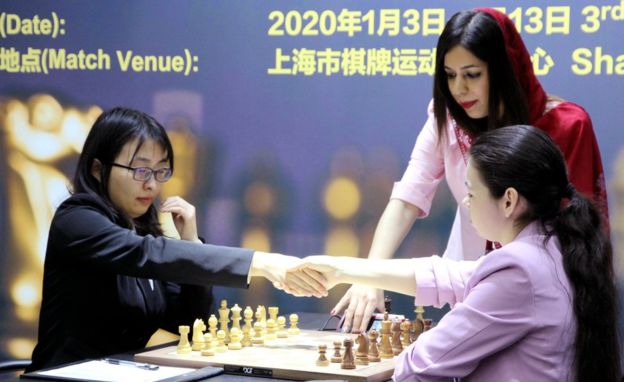February 07 2020

Another headscarf row has erupted in Iran after Shohreh Bayat, an international chess arbiter (referee) was photographed without wearing one while working at a championship in Shanghai.
She says she is now too frightened and will not return home.
“I turned on my mobile and saw that my picture was everywhere [in Iranian media]. They were claiming I was not wearing a headscarf and that I wanted to protest against the hejab,” Bayat, 32, told the BBC.
She insisted she was, in fact, covering her head as she always has at international tournaments, despite disagreeing with the rule.
“It’s against my beliefs. People should have the right to choose the way they want to dress, it should not be forced,” she said, speaking from Vladivostok in eastern Russia, where she is now refereeing the second leg of the World Championship. “I was tolerating it because I live in Iran. I had no other choice.”
The photographs circulating online and being discussed by Iran’s state media generally show Bayat’s scarf apparently draped over her shoulders and not over her hair. In other pictures from the same day, parts of her head is clearly—albeit loosely—covered.
Bayat said Iran’s chess federation instructed her to “write something” in response to the fuss, which she took to mean an apology and a defense of Iran’s dress code. She refused.
So now she says it’s too risky to return to her family. “There are many people in prison in Iran because of the headscarf. It’s a very serious issue. Maybe they’d want to make an example of me,” she said, adding that she had “totally panicked” when she saw the reaction online.
Bayat is one of only a few Category A chess arbiters in the world, a rating given to those referees showing an excellent command of the rules.
The International Chess Federation (FIDE) has not commented officially. Bayat has not broken any of its rules. But English grandmaster and now FIDE Vice President Nigel Short did tweet a photo praising the chief arbiter as “a great ambassador for her country.”
Bayat said she asked Iran’s chess federation to write a letter guaranteeing her safety on her return, but it declined. She believes officials are under pressure from higher up.
Bayat is angry that the argument over how she dresses has overshadowed her achievements in chess, where she is one of only a few top level women arbiters in the world and the only one at all in Asia.
“I can’t think of any Iranian women who have worked at such a high-level tournament. But the only thing that matters for them is my hejab, not my qualification. That really bothers me,” Bayat told the BBC.
She’s not yet sure of her own next move. But as she cannot return to Iran, she has concluded that she has nothing more to lose and has removed her hejab altogether.
“This is a very hard decision. I feel so sad because I’m going to miss my family,” she confesses, though she said taking off her scarf meant she could “be myself.”
“If I had a choice to go back to Iran, of course, I would love to,” Bayat said. “But I don’t know what would happen to me.”
Reuters reported that early in January Mitra Hejazipur, an Iranian grandmaster, was expelled from the national chess team for not wearing a headscarf at the World Rapid and Blitz Championship in Moscow.